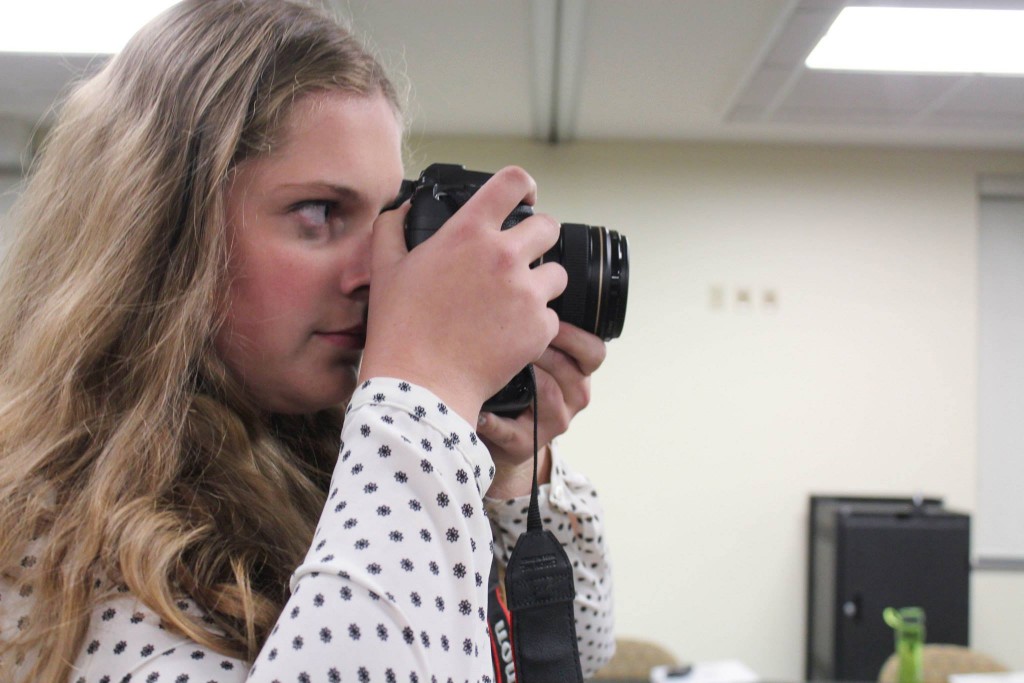
A throwback to my freshman year, as an infantile me served as the Photo Editor for the RP. Sans glasses, red lipstick and the ability to straighten my hair, apparently. Photo by Amber Levenhagen.
Being a college journalist comes with a lot of perks. It keeps you busy, gives you a way to put your education to use and allows you to see your hard work get published.
But it comes with hidden side effects. A loss of sleep, the constant use of computers which will require you to get glasses only a year in, being seen as a journalist, rather than a student.
Earlier last week, a woman of whom I’d interviewed for 15 minutes at the beginning of the semester stopped as she walked past the UWW-TV edit suites just so she could say, “Oh my gosh, you’re that journalist girl!”
It’s at this point you’re ready to say to me, “But Kim, isn’t it good that you’re seen as a journalist? Isn’t that what you want?”
In some ways, yes. Absolutely, I want to be seen as one of the “journalist girls” on campus. It allows me to look at my work, and know I’m making at least a little bit of a difference with the words I write. It validates that I’ve worked hard enough during the past three semesters in order to accomplish that.
But I still mind it a little when I see how it negatively impacts me, because I have yet to develop a skin that can’t be pierced. I still have an Achille’s heel: I’m not always viewed as a student first, at an institution where I should be.
That heel comes in the form of how I watch myself being treated, in comparison to other students. I watch our chancellor sometimes be very short and frank with me when addressing me, only to turn to another student and have a conversation with them as I stand there. Other administrators, faculty and students do the same. Many won’t talk to me on certain topics they’d talk about with anyone else, simply because they look at me not as a student, but as a journalist who wants to take down the entire university, one piece at a time.
It’s a hard idea to wrap your head around, that your treatment is so drastically linked to what you prefer to do. It certainly doesn’t help the issue of campus climate, to preach tolerance only to treat students differently based on their job title. I deserve as much attention as a student who works clerical or works as an intern in the Career and Leadership Development office.
We’re all students first at this point in our lives, and it’s easy for others to forget that with journalism majors.
I’ll take some of the responsibility for that, though. My email signature when I first got here read “Royal Purple | Photo Editor,” and nothing else. It took until last fall for me to add above it that I was a journalism and electronic media major. I unashamedly introduce myself as the News Editor for the Royal Purple, or the News Director for UWW-TV when I’m asked what I do.
My image, from the standpoint of others, is partially my own fault, but when I get snubbed, that it doesn’t make it sting any less sometimes.
At the end of the day, however, if this one of the sacrifices I have to make in order to become one of those “journalist girls,” I’ll take it. It’s a side effect I can live with, because I’m proud of my profession, and I wouldn’t want to be anything else.
It’s what the real world will be like anyways.

This is part of the business. The people who know I work in the news business usually know that they’re always on the record. The truth is that if anyone ever told me something newsworthy, I would probably never source them anyway. I’d find other sources to confirm the news. It comes up less when you leave campus because you’re less close to the people who you’re covering and a lot more people to hang out with who don’t know or care that you’re a journalist.